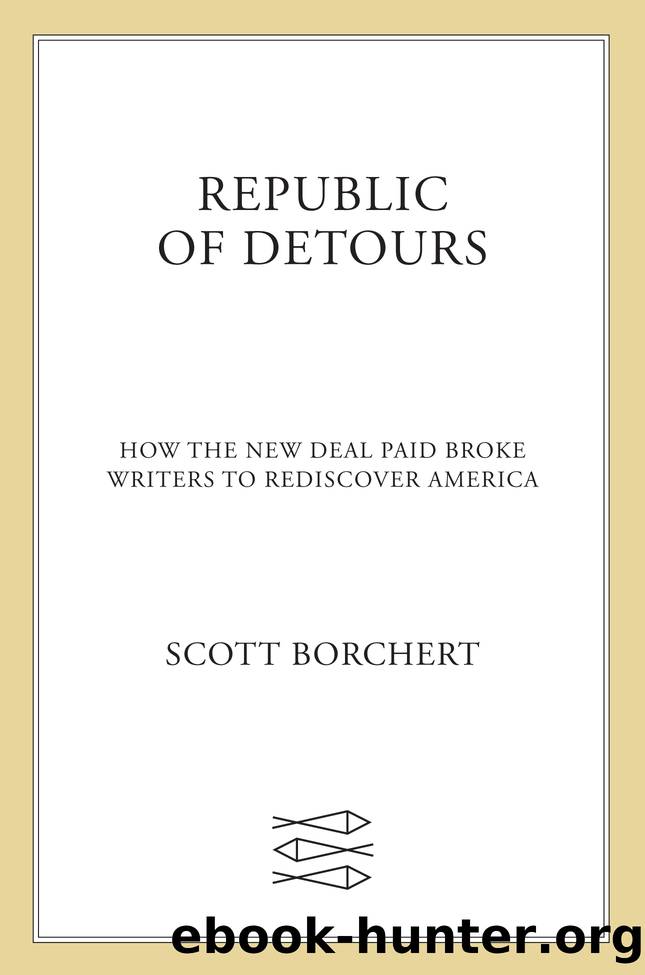Republic of Detours by Scott Borchert

Author:Scott Borchert
Language: eng
Format: epub
Publisher: Farrar, Straus and Giroux
Reading was the one thing that consistently brought Wright joy. As a child he would pick up the schoolbooks that other kids left on the sidewalk and peer at the confounding symbols. Soon his mother was helping him read the newspaper. When he lived with his grandmother, he spied a boarder reading novels, and she told him the story of Bluebeard, the serial wife-murderer. Wright later called it âthe first experience in my life that had elicited from me a total emotional response.â Eventually, he eased his way into all manner of pulp writing, westerns and detective stories, Zane Gray, Horatio Alger. (His grandmother burned the magazines when she found them and taught Wright a lesson: that fiction was inherently transgressive, a rebellious instrument.) Around the time he was sixteen, he wrote a story called âThe Voodoo of Hellâs Half-Acreâ and carried it over to a small, local Black newspaper; the editor published it in installments, much to the surprise of Wrightâs friends and the consternation of his family, who were shocked, beginning with the title. By the time of the library episode, he had discovered H. L. Mencken and was reading The American Mercury and other magazines like it; in fact, the note he passed to the librarian asked for two books by Mencken: Prejudices (a title that gave him pause, thinking of racial hate) and A Book of Prefaces (a title he couldnât fully pronounce). Wright devoured them, but not merely as an escapist indulgence. Instead, the essay impliesâand provesâthat Wright had found, in the accumulating influence of dime novels and Mencken, Dreiser and Russian literature, a means of combating the system that oppressed him.
Wrightâs essay was harrowing enough, even without mentioning two incidents that affected him deeply and permanently. When he was eight, his uncle Silas Hoskins, a successful saloonkeeper, was murdered by jealous whites. Someone brought the news in the middle of the night; Wrightâs family gathered their things and left town. His aunt Maggie couldnât even claim the body. His uncleâs murder stripped the world bare and revealed what lurked beneath its mundane surface. Wright later called it âmy first baptism of racial emotion.â A less violent but equally significant revelation came when Wright graduated from middle school. He was the class valedictorian. When the principal tried to give Wright a prewritten speechâknowing that visiting whites would be in the audienceâWright balked. He refused to replace his speech or alter it. In the principalâs behavior, and in the reactions of his family and many other students, he saw the face of Jim Crow, and the deference and bargaining it demanded. He was hurt and shocked. He gave his own speech and walked out of the ceremony. He took a stand but, in a sense, it didnât matter. Most of the other students went on to the new Black high school but Wright dropped out because he needed to work. That ended the only period of formal study he would know.
The essay says nothing, either, about
Download
This site does not store any files on its server. We only index and link to content provided by other sites. Please contact the content providers to delete copyright contents if any and email us, we'll remove relevant links or contents immediately.
Twisted Games: A Forbidden Royal Bodyguard Romance by Ana Huang(3984)
Den of Vipers by K.A Knight(2687)
The Push by Ashley Audrain(2682)
Win by Harlan Coben(2654)
Echo by Seven Rue(2237)
Beautiful World, Where Are You: A Novel by Sally Rooney(2153)
Baby Bird by Seven Rue(2113)
Iron Widow by Xiran Jay Zhao(2108)
A Little Life: A Novel by Hanya Yanagihara(2103)
Leave the World Behind by Rumaan Alam(2086)
Midnight Mass by Sierra Simone(1997)
Undercover Threat by Sharon Dunn(1779)
Bridgertons 2.5: The Viscount Who Loved Me [Epilogue] by Julia Quinn(1774)
The Four Winds by Hannah Kristin(1764)
Sister Fidelma 07 - The Monk Who Vanished by Peter Tremayne(1649)
The Warrior's Princess Prize by Carol Townend(1620)
Snowflakes by Ruth Ware(1588)
Dark Deception by Rina Kent(1557)
Facing the Mountain by Daniel James Brown(1542)
